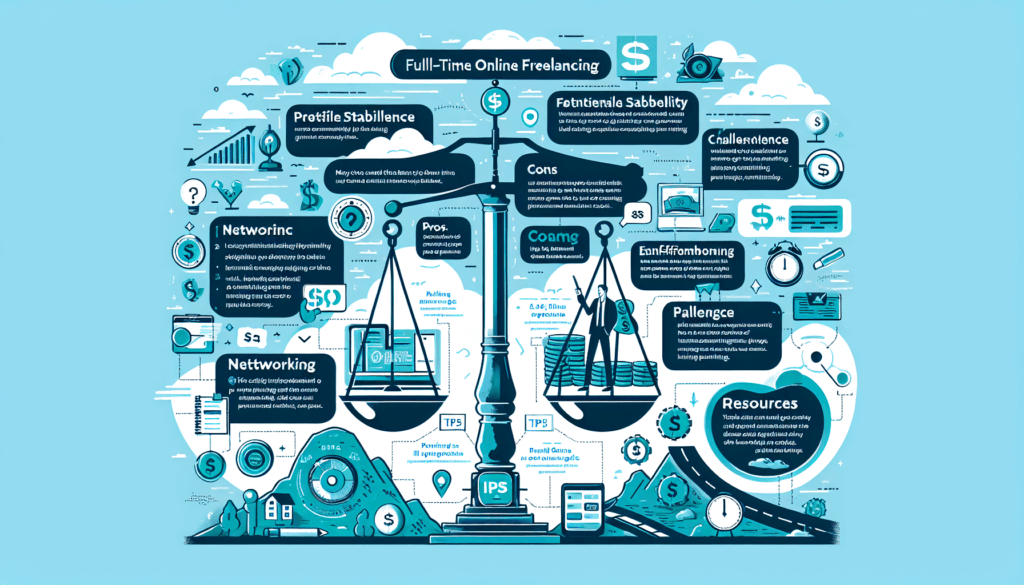If you’ve ever wondered whether it’s possible to sustain a livelihood by freelancing online, you’re not alone. The rise of the gig economy and the increasing number of people seeking flexible work options have sparked curiosity about the earning potential of freelancing. Whether you’re a budding entrepreneur, a professional seeking work-life balance, or simply someone looking to augment your income, this article aims to shed light on the possibilities of making a living through online freelancing.

Types of Online Freelancing
Writing and Editing
One of the most popular types of online freelancing is writing and editing. As a freelancer in this field, you can offer a wide range of writing services such as blog posts, articles, website content, and even proofreading and editing. This type of online freelancing is ideal for those with strong language skills and a passion for storytelling.
Graphic Design
For those with a creative flair and an eye for aesthetics, graphic design is a great option for online freelancing. As a graphic designer, you can create visual designs for logos, brochures, websites, social media posts, and more. Being skilled in design software such as Photoshop or Illustrator is a plus in this field.
Web Development
Web development is another popular freelancing option that requires technical knowledge and coding skills. As a web developer, you can create websites, modify existing ones, and ensure they function smoothly. This field offers a wide range of opportunities as every business and individual requires an online presence.
Digital Marketing
With the rise of digital advertising and online marketing, freelancing in digital marketing offers great potential. This field involves creating marketing strategies, managing social media accounts, optimizing websites for search engines, and running online advertising campaigns. If you have a strong understanding of analytics and a creative approach to marketing, this could be the field for you.
Virtual Assistance
Virtual assistance has become increasingly popular, especially for entrepreneurs and small business owners who need administrative support but don’t want to hire full-time employees. As a virtual assistant, you would provide administrative tasks such as scheduling appointments, managing emails, conducting research, and data entry.
Video Editing
Video content is on the rise, making video editing a lucrative field for freelancers. If you have skills in editing software such as Adobe Premiere or Final Cut Pro, you can work with clients to create and edit engaging videos for various platforms such as YouTube, social media, or corporate presentations.
Transcription
Transcription is a task that involves converting audio or video files into written text. This type of freelancing is perfect for individuals with good language skills and the ability to work with speed and accuracy. Transcription services are in high demand in industries such as media, journalism, and market research.
Translation
If you are bilingual or multilingual, you can offer translation services online. This involves converting written or spoken content from one language to another. The demand for translation services is high in various fields such as legal, medical, business, and literature, making this a great option for language enthusiasts.
Social Media Management
As social media platforms continue to dominate online communication, businesses and individuals require skilled professionals to manage their online presence. As a social media manager, you would create content, schedule posts, engage with followers, and analyze analytics to improve social media strategies.
Online Tutoring
With the rise of e-learning, online tutoring has become a popular choice for individuals looking to share their expertise and knowledge. Through online platforms, you can offer tutoring services in subjects such as math, science, language learning, music, and more. This field allows you to work with students from all over the world and share your expertise in a flexible manner.
Pros and Cons of Freelancing Online
Flexibility
One of the biggest advantages of freelancing online is the flexibility it offers. As a freelancer, you have the freedom to choose when and where you work. This flexibility allows you to have a better work-life balance and accommodate personal commitments.
Independence
Freelancing online provides a sense of independence as you are your own boss. You have the freedom to choose the clients you work with, the projects you take on, and the direction of your career. This independence allows for personal growth and creative expression.
Higher Earning Potential
Freelancing online offers the potential for higher earnings compared to traditional employment. As a freelancer, you have the ability to set your own rates and negotiate with clients. With experience and expertise, you can increase your rates and earn a higher income.
Global Clientele
Working online opens up opportunities to work with clients from all over the world. This global exposure allows you to collaborate with diverse individuals and businesses, expanding your professional network. It also provides the chance to learn about different cultures and work on projects with an international impact.
Variety of Projects
Freelancing online allows you to work on a variety of projects, which keeps the work exciting and challenging. Whether you enjoy writing about different topics, designing diverse graphics, or working on various websites, freelancing offers endless possibilities to explore your interests and expand your skill set.
Networking Opportunities
Through freelancing, you have the opportunity to network with professionals in your field. Building connections with clients, fellow freelancers, and industry experts can lead to future collaborations, referrals, and a stronger professional reputation. Networking is an essential component of freelancing success.
Uncertain Income
One of the challenges of freelancing online is the uncertainty of income. Unlike a traditional job with a regular paycheck, freelancers often experience fluctuations in income. It is important to budget, plan for leaner months, and build a financial safety net to handle income variations.
Lack of Benefits
Freelancers are responsible for their own benefits, such as health insurance, retirement savings, and paid time off. Unlike traditional employment, these benefits are not provided by an employer. Freelancers must take steps to ensure they have adequate coverage and plan for the future.
Self-discipline and Time Management
Working from home as a freelancer requires self-discipline and effective time management skills. Without the structure of a traditional office, it can be easy to lose focus or become distracted. Establishing a routine, setting goals, and creating a dedicated workspace are essential for success.
Isolation
Freelancing online can be a solitary profession, leading to feelings of isolation. Without colleagues or a team to interact with on a daily basis, it is important to find ways to stay connected to the professional community. Joining online communities, attending virtual events, and networking can help combat the isolation that freelancers may experience.

Building an Online Freelance Business
Identify your Skills and Niche
To start building your online freelance business, it is important to identify your skills and determine your niche. Assess your strengths and interests to determine the services you can offer. Finding a niche allows you to specialize and stand out in the crowded freelance market.
Create a Professional Portfolio
A professional portfolio showcases your skills and previous work to potential clients. Include your best samples, testimonials, and case studies to demonstrate your capabilities. Invest time in creating a visually appealing and easy-to-navigate portfolio website that represents your brand.
Build a Strong Online Presence
Having a strong online presence is crucial for attracting clients and building your freelance business. Create professional profiles on freelancing platforms, social media channels, and industry-specific websites. Share regular updates, showcase your expertise through content creation, and engage with your audience to establish yourself as a trusted expert in your field.
Market Yourself and Network
Marketing yourself is a key aspect of building an online freelance business. Utilize online marketing strategies such as content marketing, social media marketing, and email marketing to promote your services to a wider audience. Additionally, actively network both online and offline to build connections and gain referrals.
Set Competitive Rates
Determining your rates can be challenging as a freelancer. Research industry standards, consider your experience and expertise, and evaluate the value you provide to clients. Price yourself competitively to attract clients while ensuring you are earning a fair income.
Establish Clear Communication
Effective communication is essential for building strong client relationships. Clearly communicate expectations, deadlines, and deliverables with clients from the start. Respond promptly to inquiries and maintain open lines of communication throughout the project.
Manage Client Relationships
Building and maintaining good client relationships is crucial for repeat business and positive referrals. Provide exceptional customer service, demonstrate professionalism, and go the extra mile to exceed client expectations. Regularly check in with clients to ensure satisfaction and address any concerns promptly.
Maintain a Consistent Workflow
Consistency is important for successful freelancing. Establish a routine and dedicated workspace to maintain focus and productivity. Set goals, prioritize tasks, and use project management tools to stay organized and meet deadlines.
Seek Feedback and Continuous Improvement
Feedback is invaluable for growth and improvement as a freelancer. Regularly seek feedback from clients to identify areas of improvement and determine what is working well. Continuously invest in learning and skill development to stay relevant in your industry.
Secure Your Finances
Freelancers are responsible for managing their own finances. Set up separate business accounts, track income and expenses meticulously, create professional invoices and contracts, and understand tax obligations and regulations. Seeking professional accounting services can help ensure financial stability and compliance.
Finding Freelance Opportunities
Freelance Job Platforms
Freelance job platforms such as Upwork, Freelancer, and Fiverr are popular places to find freelance opportunities. Create a professional profile, showcase your skills, and actively apply for relevant jobs on these platforms.
Online Marketplaces
Online marketplaces such as Etsy, Creative Market, and Shutterstock are ideal for freelancers in creative fields. List your products or services on these platforms to reach a wider audience and attract potential clients.
Networking and Referrals
Networking and referrals can be powerful tools for finding freelance opportunities. Attend industry events, join online communities, and connect with professionals in your field to expand your network. Additionally, ask satisfied clients for referrals to tap into their networks.
Social Media
Utilizing social media platforms such as LinkedIn, Twitter, and Instagram can help you find freelance opportunities. Promote your services, engage with industry influencers and potential clients, and leverage hashtags and groups to connect with like-minded individuals.
Professional Associations and Communities
Joining professional associations and communities in your industry can provide valuable opportunities. These organizations often have job boards, networking events, and resources that can help you find freelance work.
Cold Pitching
Cold pitching involves reaching out to potential clients directly via email or social media. Research companies or individuals in your target market and customize your pitch to demonstrate your value and how you can help solve their problems.
Creating a Personal Website
Having a personal website is a powerful way to showcase your work and attract potential clients. Create a professional website that highlights your skills, services, and portfolio. Optimize it for search engines to increase your online visibility.
Specialized Freelance Platforms
Depending on your niche or industry, specialized freelance platforms may exist that cater specifically to your field. Research and explore these platforms to find freelance opportunities tailored to your expertise.
Collaboration with Agencies
Collaborating with creative agencies or larger companies can be a great way to find freelance work. Reach out to agencies that align with your skills and inquire about collaboration opportunities or project-based work.
Remote Job Boards
Remote job boards such as Remote.co, FlexJobs, and We Work Remotely list remote job opportunities across various industries. While not exclusively for freelancers, these platforms often have freelance roles available.
Building a Solid Portfolio and Resume
Showcasing Diverse Work
Your portfolio should showcase a diverse range of work that highlights your skills and capabilities. Include samples from various projects, industries, and clients to demonstrate your versatility and expertise.
Highlighting Relevant Skills and Experience
Tailor your portfolio and resume to highlight the skills and experience that are most relevant to the type of freelance work you are seeking. Clearly articulate how your past work and accomplishments align with the needs of potential clients.
Including Testimonials and Recommendations
Including testimonials and recommendations from satisfied clients adds credibility to your portfolio and resume. Request feedback from clients you have worked with and showcase their positive comments to build trust with potential clients.
Optimizing for Keywords
Optimize your portfolio and resume with relevant keywords to increase its visibility in search engines and freelance platforms. Use industry-specific terms, skills, and job titles to attract the attention of potential clients and improve your chances of being found.
Keeping it Up-to-Date
Regularly update your portfolio and resume with your latest work, skills, and achievements. Remove outdated or irrelevant information to ensure your portfolio is concise and up-to-date.
Using Visuals to Enhance Presentation
Incorporate visuals such as images, videos, or infographics in your portfolio to enhance the presentation of your work. Visuals can help potential clients better understand your capabilities and make your portfolio more engaging.
Creating a Compelling Summary
Craft a compelling summary that introduces yourself, your expertise, and what sets you apart from other freelancers. Highlight your unique value proposition and the benefits clients can expect from working with you.
Tailoring for Each Opportunity
Customize your portfolio and resume for each freelance opportunity you apply for. Emphasize the skills and experiences that are most relevant to the specific project or client to increase your chances of success.
Including Certifications and Qualifications
Include any relevant certifications, qualifications, or training programs you have completed in your portfolio and resume. These credentials can differentiate you from other freelancers and provide proof of your expertise.
Including Link to Professional Website or Blog
Include a link to your professional website or blog in your portfolio and resume. This allows potential clients to explore more of your work and get a better understanding of your skills and expertise.
Managing Finances as an Online Freelancer
Setting Up Separate Business Accounts
Setting up separate business accounts for your freelance income and expenses is crucial for financial organization. It helps you track your business finances accurately and simplifies tax preparation.
Tracking Income and Expenses
Track your freelance income and expenses to ensure you have a clear understanding of your financial situation. Utilize accounting software, create spreadsheets, or hire a professional accountant to assist with managing your finances.
Creating Invoices and Contracts
Create professional invoices and contracts for every project to ensure clear communication of payment terms and protect yourself legally. Clearly outline the scope of work, payment schedule, and any additional terms or conditions.
Tax Obligations and Regulations
Understand your tax obligations and regulations as a freelancer to avoid any legal issues. Research the specific tax laws in your country or consult with a tax professional to ensure compliance and maximize tax deductions.
Saving for Retirement and Emergencies
As a freelancer, it’s important to plan for your financial future. Set aside a portion of your income for retirement savings and create an emergency fund to provide a safety net in case of unexpected expenses or lean periods.
Managing Irregular Income
Irregular income is a common challenge for freelancers. Budgeting and creating a financial plan that accounts for lean months can help alleviate financial stress. Consider setting aside a portion of each payment into a separate account to even out income fluctuations.
Seeking Professional Accounting Services
If managing your finances becomes overwhelming, consider seeking professional accounting services. An accountant can help with bookkeeping, tax filing, and financial planning, freeing up your time to focus on your freelance work.
Pricing Strategies for Profitability
Setting your rates appropriately is essential for profitability. Consider your expenses, time investment, and desired income to determine your rates. Research industry standards and be open to adjusting your rates as your experience and skills grow.
Reevaluating as Your Business Grows
As your freelance business grows, regularly reassess your pricing and financial strategies. Adjust your rates to reflect your experience and expertise, and consider investing in tools or resources that can improve your efficiency and profitability.
Protecting Yourself from Non-payment
Unfortunately, non-payment can be a risk for freelancers. Protect yourself by requiring upfront deposits or milestone payments, setting clear payment terms, and utilizing contracts that include consequences for non-payment. Consider using secure payment platforms to reduce the risk of non-payment.

Navigating Challenges as an Online Freelancer
Dealing with Difficult Clients
Difficult clients are inevitable in any business, including freelancing. Set clear boundaries, maintain open lines of communication, and address any concerns or issues promptly and professionally. Sometimes, it may be necessary to end a working relationship if it becomes untenable.
Handling Scope Creep and Project Changes
Scope creep occurs when a client requests additional work or changes to the original project without adjusting the agreed-upon terms. Clearly define the scope of work in your contracts and communicate any additional charges or adjustments to the client.
Overcoming Impostor Syndrome
Impostor syndrome, the belief that you are not as competent as others perceive you to be, is common among freelancers. Remember that you possess unique skills and experiences that clients value. Build your confidence by seeking feedback and continuously improving your skills.
Avoiding Burnout
Freelancing can be demanding and result in burnout if you don’t prioritize self-care. Take regular breaks, rest, and engage in activities that recharge you. Set boundaries around your working hours and limit the amount of work you take on to avoid burnout.
Maintaining Work-Life Balance
Maintaining a healthy work-life balance is essential for long-term success and well-being. Establish clear boundaries between work and personal life, schedule time for relaxation and recreation, and don’t let work overrun your personal time.
Managing Multiple Projects and Deadlines
Managing multiple projects and deadlines requires effective time management and organizational skills. Use project management tools, create schedules, and break down projects into manageable tasks to ensure you meet deadlines without feeling overwhelmed.
Adapting to Industry Changes
Industries are constantly evolving, and it’s important for freelancers to stay updated on industry trends and changes. Invest in continuous learning, attend relevant webinars or workshops, and adapt your skills to meet the evolving needs of clients.
Handling Legal and Contractual Issues
Freelancers may encounter legal issues such as copyright infringements, breach of contract, or non-payment. By having well-drafted contracts, understanding copyright laws, and being proactive about legal protection, you can minimize the risk of legal issues and protect your rights.
Continuous Learning and Skill Development
Continuous learning and skill development are crucial for staying competitive in the freelancing market. Stay informed about industry trends, take online courses or certifications, and actively seek opportunities to enhance your skills and broaden your knowledge.
Staying Motivated and Focused
As a freelancer, self-motivation and focus are essential for productivity and success. Set goals, create a routine, break down tasks into smaller steps, and find ways to stay inspired and motivated. Celebrate your achievements to maintain a positive mindset.
Balancing Freelance Work with Full-Time Employment
Understanding Employment Contracts and Agreements
If you are freelancing while employed full-time, review your employment contract to ensure there are no conflicts of interest or non-compete clauses. Understand the terms of your employment and any limitations on freelancing.
Prioritizing and Allocating Time Effectively
Balancing freelance work with full-time employment requires effective time management and prioritization. Allocate specific hours to each role, create to-do lists and schedules, and be disciplined about adhering to them.
Avoiding Conflicts of Interest
Ensure there are no conflicts of interest between your full-time job and freelancing work. Avoid working with clients or projects that are in direct competition with your employer or potentially compromise your employment.
Managing Energy and Fatigue
Working both full-time and freelancing can be physically and mentally demanding. Take care of your health, get enough rest, and prioritize self-care activities to manage energy levels and combat fatigue.
Open Communication with Employers
Maintain open communication with your full-time employer regarding your freelance work. Inform them about your freelance activities, clarify any potential conflicts, and ensure that your freelance work does not compromise your full-time employment.
Maintaining Professionalism and Confidentiality
Maintain professionalism and confidentiality in both your full-time job and freelance work. Respect confidentiality agreements, separate client-related information, and avoid discussing sensitive information related to your full-time job.
Using Non-Working Hours Efficiently
Utilize non-working hours efficiently to dedicate time to your freelance work. Set realistic goals and prioritize tasks to ensure you make progress on both fronts without sacrificing your personal life.
Establishing Boundaries and Schedules
Establish clear boundaries and schedules for your freelance work and full-time employment. Define your working hours, communicate expectations with clients, and ensure you have time for personal commitments.
Avoiding Overcommitment
Avoid overcommitting yourself by taking on too many freelance projects while working full-time. Be realistic about your capacity and availability to maintain high-quality work and prevent burnout.
Leveraging Transferable Skills
Identify transferable skills between your full-time job and freelance work. Leverage these skills to enhance both aspects of your professional life and create synergies between your different roles.
Tips for Success as an Online Freelancer
Adopting a Professional Mindset
Approach freelancing with a professional mindset. Take your work seriously, prioritize client satisfaction, and continuously strive for excellence. Treat your freelance business as a professional entity that delivers high-quality services.
Setting Realistic Goals and Expectations
Define realistic goals and set clear expectations for yourself and your clients. Establish measurable objectives, create actionable plans to achieve them, and communicate milestones and deadlines with your clients.
Effective Time Management
Mastering time management is crucial for freelancers. Create schedules, break down tasks, and set deadlines to ensure you manage your time effectively and meet client expectations.
Continuously Improving Skills
Freelancers should constantly strive to improve their skills to stay competitive. Invest in continuous learning, take courses, attend workshops, and actively seek opportunities to enhance your skills and knowledge.
Building a Reliable Network
Build a network of professionals and potential clients in your industry. Attend industry events, join online communities, and connect with like-minded individuals to expand your network and gain referrals.
Managing Workload and Expectations
Properly managing your workload and client expectations is vital for maintaining a positive reputation. Be realistic about your capacity, set clear project scopes, and communicate any limitations or potential delays to your clients.
Providing Exceptional Customer Service
Deliver exceptional customer service to your clients by being responsive, proactive, and attentive to their needs. Strive to exceed expectations, maintain open lines of communication, and handle any concerns or issues promptly.
Seeking Ongoing Client Feedback
Regularly seek feedback from clients to understand their satisfaction level and identify areas for improvement. Actively listen to their input, utilize it to enhance your services, and continuously strive to provide an outstanding client experience.
Adapting to Market Trends
Staying updated on market trends and emerging technologies is key to remaining relevant and competitive. Embrace new tools, techniques, and industry trends to offer innovative solutions to your clients.
Maintaining a Growth Mindset
Cultivate a growth mindset that embraces challenges, values feedback, and is open to continuous learning. Embrace opportunities for growth and don’t be afraid to step out of your comfort zone to expand your skills and capabilities.
Conclusion
Freelancing online offers a world of opportunities for individuals looking to build a successful and fulfilling career. Whether you choose to focus on writing, graphic design, web development, or any other field, the flexibility, independence, and potential for higher earnings make freelancing an attractive option. By taking the time to build your online presence, market yourself effectively, and manage your finances and client relationships, you can navigate the world of freelancing with confidence. Remember to continuously develop your skills, adapt to market trends, and maintain a professional mindset to ensure long-term success as an online freelancer.


